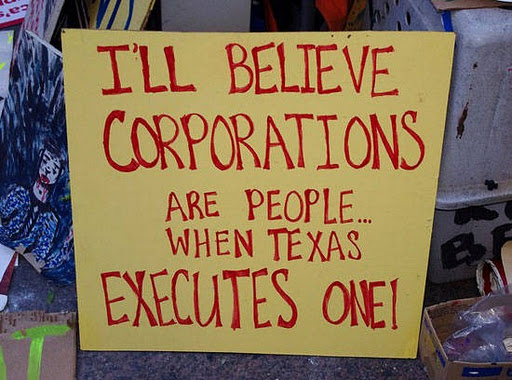I knowWow that was short.

Interesting comparison of the potential future POTUSes...
#21

Posted 12 January 2012 - 10:52 PM
#22

Posted 13 January 2012 - 12:35 AM
The youtube video
1: That one falls flat pretty quick, as it assumes every corporation loans credit to buyout other corporations. These people know how to earn cash. They do it the apple way by creating mini-monopolies for a few years or they do it other ways. Then they spend that surplus cash that just lies around in their vault. Also, once a company buys a smaller company, the total value is bigger than the sum of its parts, making them even harder to compete with.
And once you get big enough you get enough gravity that customers automatically assume size==quality, so the theory that fewer competing corps should increase their value seems unlikely.
2: Collusion: percentages. People do not buy what you sell but what you believe. You can sell an equal product of different brand for a slightly higher prices as long as the consumer believes in your brand. The theory of the collapse of collusion is one of the better theories of the free marked though, but consider gas prices: the gas-stations are very quick at rising the prices, but they all have much better time reducing the prices once the oil prices fall again. Some might lower it more and earlier than their competitors, but people are habit-creatues so they just go where they always go. As long as you keep within the margin of apathy, you can collude pretty damn well.
3. undercutting: globalism, outsourcing. Sure in theory this is true, but only if the entire world was equal in wages and worker rights. Which it ain't.
4. Yeah, that is pretty true these days, very few people can get away creating breaking products now. My grandpa was a tv-repairman back in the 60s-80s, and back then 20% of TVs needed repairs every year from year 1, but since every TV was like that nobody really could do anything about it. With internet its even easier to double-check, so we're in good times here.
5
Inconsistent comparison fallacy - where different methods of comparison are used, leaving one with a false impression of the whole comparison
Reification fallacy
Wrong direction fallacy – I never wanted to run away from home when I was a child. Maybe there is a reason this child wants to run away from home? Abusive or restrictive family?
Argumentum ad populum
Association Fallacy – Ron Paul is a leader of a Libertarian movement. He is childish for questioning government authority (even if it's unconstitutional) – this means all Libertarians who support Ron Paul are childish.
Appeal to consequences – Kid running away from home represents adult running away from government. Kid running from home must return home to remain safe and be provided everything they need to survive, therefore adults who are against big government must also eventually return to big government because government is the only provider for their needs.
Firstly, metaphor of the kid is a metaphor, or a trope/clichê for somewhat typical childhood behaviour. I don't consider it a projection onto the believers, but a example of how such a system might look.
It does however define Libertarianism for me. Probably because I have a belief in these veins: If you don't accept that you need a strong government to uphold laws, it doesn't matter that you say you are for laws that empower people. Because without a strong government, there cannot be strong civillian retaliation to abuse. Courts up here are one of the three columns of our government. If you claim you have a strong court system that protects the individual while keeping the government at a minimum, you are showing me a paradox.
I'll also admit that I was in a hurry when I saw that article and mostly just pasted that first part which I liked. The rest is pretty dull and filled with generic rhetoric. Still, the metaphor of the runaway child rings very true with me about the believers of Libertarianism. And once you start saying you are not against governance, I start thinking that isn't libertarianism but social-liberalism, which is where I'm at politically.
"Freedom and responsibility"/"personal freedom with responsibility for the community" is my party's motto, which might sound very libertarian, but its social-liberal/old radical(<-- against persons given power purely by their position and personal power(priest, judge, trader, noble) instead of being elected by the people from the people) up here...
As for the rest of the argument, small business is indeed the answer, but it can only be "stimulated" through free markets and removing unfair legislation passed by lobbyists for corporations. Hence, ENDING CORPORATISM. We also need sound money to ensure the money supply cannot be manipulated and with it wealth concentrated into the hands of a few.
There are a few arguments on how to do this. Ron Paul's way: legalise competition. I like this idea.
Other way – return currency creation to an open central government treasury. Get government to produce debt free money and obviously be open and transparent with money creation, e.g. accurate reports on real inflation rates.
Personally I think Paul's idea is better because then the market will regulate the money supply (for different currencies). Businesses and people can refuse to trade in certain currencies. If a currency goes bad, there are options to switch to another. In this current system, government enforced banking monopoly, if currency goes bad then we are all screwed.
Corporatism is a problem and it needs, regulation. You can't "end" it without applying energy to it in some fashion. You need to burn down the windmill with the monster in it, not decide the monster is unwanted and ignore it.
As long as Ron comes up with these laws and avoids reducing the power of the lawbringer I see little problem with his ideas. Most of the points above aren't really libertarian-only though.
1. Here is more circular logic. Support Strong (big) government to stop corporation-fascism, which is only possible anyway because of big government. You sound like some of the guys at the occupy events. You can argue with the more progressive guys about how big government attracts psychopaths, the power hungary and/or corporate lobbyists which helps to create fascism and their response is that we just need more government.
2. Big government cannot stimulate the economy or make small businesses prosper. I still fail to see how you think this works economically. It's almost like Keynesianism with the broken window fallacy. Break a window, stimulate the economy by helping the glass
man.
1. I'd say it would be very possible without government as well. I think my primary problem with Libertarianism is this belief that government is the root of all evil. It does not compute, or in Tom terms, an irrelevant conclusion - or at the very best, a subjective one. A government run by corporations is indeed a bad thing, but if you are unable to arm-wrestle these corporations, they will own the land you till. And beyond revolution, governments are the best solution to fix it.
2.Keynes seem to have done more right than the alternatives have. Besides, Norway refutes your argument of being unable to stimulate economy and make small business prosper. Having a government with the power and will to do hard actions is a good thing at times.
Anyway, I could probably have kept on going, but I'm an hour overtime for minimum sleep time already and I suspect that I'll write more wrong than right if I continue
Edited by duke_Qa, 13 January 2012 - 12:36 AM.
"I give you private information on corporations for free and I'm a villain. Mark Zuckerberg gives your private information to corporations for money and he's 'Man of the Year.'" - Assange
#23

Posted 13 January 2012 - 03:59 AM
1. Monopolies are very real. The logic given in the video as to why they can't exist is total bullshit.
3. Undercutting: Also, very real. And very visible in most small towns in the US. Any small town where a Wal*Mart moves into experiences this.
I've got a good video for you to watch.
It's called Wal*Mart: High Cost of Low Prices. (It's an hour and a half so, it might take a while.)
Very insightful, enlightening, and educational. It really tells the story of what happens to any community where a Walmart moves into.
http://www.youtube.com/watch?v=Hftb_DVuelo
Edited by Ganon, 13 January 2012 - 04:17 AM.
#24

Posted 13 January 2012 - 04:29 AM
... Do we not have any other good deep though subjects or is this it?
#26

Posted 14 January 2012 - 03:32 PM
When we start arguing semantics on a semi-global webforum, references are bound to be so different that it will most likely burst into flames
The thing that caught my attention when I was skimming that Wal-mart documentary was the comments on Wal-mart getting subsidiaries from the government where competing small-businesses do not. A fine example of 1% "socialism". Combining that with the fact that a mega-corp can afford private jets filled with experts for annihilating competition and/or union manifestation, you don't really stand a chance as a local entrepreneur.
- Tom likes this
"I give you private information on corporations for free and I'm a villain. Mark Zuckerberg gives your private information to corporations for money and he's 'Man of the Year.'" - Assange
#27

Posted 15 January 2012 - 08:42 PM
I'm not saying monopolies cannot occur in a completely free market - towns would be an easy place monopolies can occur. A large percentage of permanent monopolies or larget scale monopolies however can only occur WITH government help. Unfair laws that do not allow the free market to do it's thing of trying to achieve equalibrium. And actually, government itself is a permanent monopoly. The more it expands the more it monpolizes whatever area it has expanded into, e.d. Education, Healthcare, etc. [Generalisation that may be incorrect based on the feeling I get]You guys have spent far too much time watching biased documentaries and not reading any real economics. Read a range, Hayek, Keynes, Keen, Mises, etc. It's easy with the Internet now. Use it.[/Generalisation that may be incorrect based on the feeling I get]
Duke seems a lot more aware of this than a few of the other guys on this forum.
Keynes has done a lot for economic thought Duke, but it's being accepted more and more that Keynesian ideas actually prolonged the depression in the US, rather than end it early. A lot of dissident economics are saying this now - you know, the ones who predicted our current economic crisis. I think I trust them more to know what they are talking about that people such Bernanke and other neoclassical economists who claim they could never have seen this coming. Although Bernanke did admitted in 2002 that the Federal Reserve caused the depression.
Ben Bernanke, the current Chairman of the Federal Reserve, agreed with Friedman in blaming the Federal Reserve for its role in the Great Depression, and stated on Nov. 8, 2002:
"Let me end my talk by abusing slightly my status as an official representative of the Federal Reserve. I would like to say to Milton and Anna: Regarding the Great Depression. You're right, we did it. We're very sorry. But thanks to you, we won't do it again."[6]
http://www.federalre...108/default.htm
The issue with Keynes is he promotes the broken window fallacy. Break windows to stimulate the economy! Sure it gets people spending, but it doesn't produce any real productivity or new wealth or innovation. This is why I like Praxeology. I personally believe that Austrian economics and Praxeology will have a bigger role in the future after this crisis is truly over (with which has been predicted as the collapse of the dollar as a world reserve currency and after people have fought off this ridiculous notion of a world currency based on the same principles as we have now - making no new or real progress). However that doesn't make it infallible and it doesn't mean that in the future we won't need further evolutions of ideas. Just a personal opinion.
Also, back on these forums in 2005/6 I was saying the Amerian economy is due to crumble - People like Eric use to oppose me on this saying this was crazy talk but... who was proved right [/end being a smug dickhead].
Anyway, I will try get to claims on each post later this week if/when I get the time.
Whilst I mentioned world currency, what do people make of this; http://www.cnbc.com/...nk_to_Be_Set_Up
#28

Posted 15 January 2012 - 09:02 PM
I dunno how the American market can 'crumble'... too many consumers. It can get worse, but it's not going to crumble like Stalingrad or something. Only until we reach a critical population crisis can the world economy as a whole go poo-brain down... but the world can provide enough resources if we doubled in population, but not by much after that.
#29

Posted 15 January 2012 - 09:11 PM
You either go full socialised healthcare or you have free market healthcare. I think if you have a mix of either of them then innovation is stifled (I believe socialism naturally does this anyway) and costs are inflated. This should be on a state level imo. So if Maryland wants a healthcare system they can without interferring with people in Texas who do not want one. If people want to move to a place with socialised healthcare, then surely that is up to them to make that move and become a resident of that state.
In theory, I think it works well.
Also corporate personhood is an issue in free market capitalism. I personally believe free market capitalism cannot work whilst corporate personhood exists as it does today. Corporate personhood gives corporations an unfair advantage over the market - and in political campaigns, which I believe should not be allowed. In theory, only induviduals exist, not groups. Rights belong to the induvidual. Corporations or any other collective (unions, certain groups of people based on race, religion, status and so on) in society should not get rights - rights belong to induviduals and induviduals should all receive equal rights under the law.

Also, because of this model I believe psychopaths are drawn to high up positions (that is people without empathy) and that is why so many corporations and governments act immorally. I personally believe that we need to educate ourselves on this and become much more aware.
Now here I am being a hypocrite - talking about biased documentaries and then posting one
#30

Posted 15 January 2012 - 09:14 PM
I'm sorry economics bores you. Find something you find more interesting then.Are we still on this topic? Lame.
The fact that the US economy has "too many consumers" is exactly why it can crumble. An economy based on spending isn't real. It just requires people to keep spending to keep it propped up. Neo liberal economics promotes this idea of infinite growth and for infinite growth to work you need infinite spending and infinite consumption of resources. This is why people blame capitalism for destroying the environment - it's not true - it's just one school of thought. Capitalism is bigger than neoliberal theory.I dunno how the American market can 'crumble'... too many consumers. It can get worse, but it's not going to crumble like Stalingrad or something. Only until we reach a critical population crisis can the world economy as a whole go poo-brain down... but the world can provide enough resources if we doubled in population, but not by much after that.
The economy can crumble as a result of a currency crisis - like Zimbabwe. The US global fiat monetary system is nearing the end of it's lifespan, or so many dissident economists believe.
Printing too much money and inflating the dollar globally will cause people to lose faith in it and start dumping it for other currencies. If this happens on a large scale, the US dollar will collapse and with it the US economy will completely implode. We may be witnessing another collapse of a large society in the space of 20/30 year period - the USSR being the first.
This could also end the consensus on neoclassical economics.
You are right about resources and population, but what you are failing to understand is the cohesion that money provides to global economics. There is a huge global banking scam occurring right now called fiat money. When this scam gets more exposed and collapses then it will take years for a full recovery. When government/private banks have a monopoly on the issuance of money and that monetary policy/system fails then the effects are devestating. It doesn't matter how many resources the world has, without money, there is no central means of exchange and we are temporary thrown back into a barter system. Just look up Argentina in 1991 or Zimbabwe in 2007.I dunno how the American market can 'crumble'... too many consumers. It can get worse, but it's not going to crumble like Stalingrad or something. Only until we reach a critical population crisis can the world economy as a whole go poo-brain down... but the world can provide enough resources if we doubled in population, but not by much after that.
#31

Posted 15 January 2012 - 11:07 PM
But yeah, there are those up there that have what we would define as psychopathic traits. We are not up there, so we can't compare. I'm currenly have an office in an office for entrepenours, and its a totally different mental state to be an entrepenour than it is to be an employee. That is also my main gripe with socialists and labour-party parties: they don't really support those who innovate and are willing to risk life and limb to do something with no guarantee of success.
Scandinavian countries have a population significantly smaller than most of the other countries we are often debating about (The US and UK included). I imagine healthcare systems would work better on a state level in the US than it would at a federal level. Which is why I believe things like Obamacare should be repealed. States should adopt their own healthcare systems if they want them. Personally I believe Obamacare is unconstitutional and empowers corporations including pharmaceuticals.
You either go full socialised healthcare or you have free market healthcare. I think if you have a mix of either of them then innovation is stifled (I believe socialism naturally does this anyway) and costs are inflated
Our cost per citizen in healthcare is less than Britain and the US. I suspect its because we don't have private middleman corps doing their best to jack up their income through their customers. Even if you scaled it by 10x(britain I think) or 60x, I doubt that it would magically cause the system to stop working. Sometimes government intervention with the philosophy "this place needs as few middle-men as possible" is a boon.
The healthcare system Obama started on was another round of endless paperhell which tries to patch a system that should have been tossed out the window instead of updated. It was a step in the right direction but on its own not enough to last more than a decade or two. Sometimes you need to shake things up and redo things.
State-oriented healthcare laws would be a possibility and probably easier to get through. I suspect that the loopholes and the health-based emigration from non-healthcare states to healthcare states would cause a problem right off the bat though, like communist students running to the west after a free education in the USSR back in the day. I dunno how unhappy the non-healthcare states would be about having all the unhealthy moving out though, so it would probably be the more socialistic states that gets the bill for other states... good times eh.
I've yet to see a free-market healthcare actually be more effective than socialized. Sure if you have the cash to fly to florida/USA every time you get a tumor then by all means, its more effective. But I'm not really interested in 1% healthcare since that will run itself, it has paying customers after all. I'm more interested in letting the 99% have as little hell in their lives as possible, and if you don't have to stress about such things, you also live longer
Also corporate personhood is an issue in free market capitalism. I personally believe free market capitalism cannot work whilst corporate personhood exists as it does today. Corporate personhood gives corporations an unfair advantage over the market - and in political campaigns, which I believe should not be allowed. In theory, only induviduals exist, not groups. Rights belong to the induvidual. Corporations or any other collective (unions, certain groups of people based on race, religion, status and so on) in society should not get rights - rights belong to induviduals and induviduals should all receive equal rights under the law.
Yup, corporations shouldn't have such rights, unions shouldn't have such rights, religions shouldn't have such rights. The only way I imagine such things being stopped is by getting money out of politics, which is quite tricky in its own right. But it certainly would have been a massive leap compared to today.
The issue with Keynes is he promotes the broken window fallacy. Break windows to stimulate the economy! Sure it gets people spending, but it doesn't produce any real productivity or new wealth or innovation. This is why I like Praxeology. I personally believe that Austrian economics and Praxeology will have a bigger role in the future after this crisis is truly over (with which has been predicted as the collapse of the dollar as a world reserve currency and after people have fought off this ridiculous notion of a world currency based on the same principles as we have now - making no new or real progress
I always thought that once people started saying Keynes thought of war as a tool to reboot an economy, you're kinda reading him as the devil reads the bible. Keynes is primarily for me about stimulus in bad times to avoid total implosion, and I am pretty sure we can agree that the stimulus packages we've seen get passed have reduced the impact of the crisis, even if some of that money went to the bastards who made it in the first place. That is our job as frustrated citizens to fix, and it will be our fault if we let them continue as they've done earlier and it happens again.
hmm, so Praxeology looks like Economic theory that says money isn't just numbers but it has the soul and motivation of its human owners. Logical enough, I'm surprised if the keynesians haven't tried to emulate that through a mathemathical formula of sorts though.
Keynes has done a lot for economic thought Duke, but it's being accepted more and more that Keynesian ideas actually prolonged the depression in the US, rather than end it early. A lot of dissident economics are saying this now - you know, the ones who predicted our current economic crisis. I think I trust them more to know what they are talking about that people such Bernanke and other neoclassical economists who claim they could never have seen this coming. Although Bernanke did admitted in 2002 that the Federal Reserve caused the depression.
This explains imo why the current economists didn't get the warning out. Some did notice, but they were largely ignored.
http://www.youtube.com/watch?v=u5um8QWWRvo
Even if keynes theoretically prolonged it, thats what they say today as well. But most theories say that the consequences would have been much worse if we didn't do stimulus packages. We could probably look at some small nations that didn't have the cash to support stimulus packages for examples(Eastern Europe is pretty bad), and I suspect that's where we would have been.
Edited by duke_Qa, 15 January 2012 - 11:08 PM.
"I give you private information on corporations for free and I'm a villain. Mark Zuckerberg gives your private information to corporations for money and he's 'Man of the Year.'" - Assange
#32

Posted 16 January 2012 - 07:35 AM
Yet Ron Paul's appeal goes beyond these specific positions. His libertarianism itself is beguiling. Like many extreme ideologies, libertarianism gives a single answer to a complicated world. It seems to cut through the fog and get to the heart of solutions; illusions, alas, but powerful ones nonetheless. Libertarianism is the single-minded defense of liberty. Many young people flock to libertarianism out of the thrill of defending such a valiant cause. They also like the moral freedom that libertarianism seems to offer: it's okay to follow one's one desires, even to embrace selfishness and self-interest, as long as it doesn't directly harm someone else.
Yet the error of libertarianism lies not in championing liberty, but in championing liberty to the exclusion of all other values. Libertarians hold that individual liberty should never be sacrificed in the pursuit of other values or causes. Compassion, justice, civic responsibility, honesty, decency, humility, respect, and even survival of the poor, weak, and vulnerable -- all are to take a back seat.
[...]
By taking an extreme view -- that liberty alone is to be defended among all of society's values -- libertarians reach extreme conclusions. Suppose a rich man has a surfeit of food and a poor man living next door is starving to death. The libertarian says that the government has no moral right or political claim to tax the rich person in order to save the poor person. Perhaps the rich person should be generous and give charity to the neighbor, the libertarian might say (or might not), but there is nothing that the government should do. The moral value of saving the poor person's life simply does not register when compared with the liberty of the rich person.
Most ethical and political systems find the libertarian position abhorrent, indeed preposterous. Most would hold that the government can, should, and indeed must, tax the rich person to save the poor person. That's because most ethical and political systems hold that liberty is only one value among many important values, and that the value of the indigent's life takes priority over the liberty of the rich individual.
[...]
Political libertarianism is the idea that only the strict devotion to liberty will preserve liberty, and that government intervention is "the road to serfdom," in the famous words of Hayek. Hayek wrote his defense of free markets in 1945, in the shadow of fascism and communist totalitarianism. He warned his readers in Western Europe not to endorse state ownership of industry because public ownership, said Hayek, would eventually undermine political freedoms. The idea of limited government in the defense of liberty clearly taps into America's founding history as well, tea party and all.
Yet political libertarianism is not much of a guide to real-world politics. Modern history has shown that activist democratic governments, ones that provide public goods and help for the poor, do not really threaten liberty. In Scandinavia, for example, where the governments are much more activist than in the United States, democracy is very vibrant and far less corrupt than in the U.S. In fact, by keeping mega-income under control, the Scandinavian countries have avoided the kind of plutocracy -- government by the rich -- that has engulfed Washington.
Also, it might paint libertarianism in a bad light again, but it is pretty much the best definition I've seen as of yet. Hayek did write his book in 1945, a different world than what we are living in. As mentioned above, "activist"/social-democratic governments that go against the grain of libertarian ideology, haven't fallen into Hayek's dystopian theories. If anything, Hayek's happy-go-lucky utopia of Laissez-faire has proven to be just as much a wolf in sheep's clothing as the alternative.
Edited by duke_Qa, 16 January 2012 - 08:21 AM.
"I give you private information on corporations for free and I'm a villain. Mark Zuckerberg gives your private information to corporations for money and he's 'Man of the Year.'" - Assange
#34

Posted 16 January 2012 - 05:24 PM
"I give you private information on corporations for free and I'm a villain. Mark Zuckerberg gives your private information to corporations for money and he's 'Man of the Year.'" - Assange
#35

Posted 18 January 2012 - 10:02 PM
Bullshit. Most biased piece of shit article I've read for a long time. Poorly researched.Yet the error of libertarianism lies not in championing liberty, but in championing liberty to the exclusion of all other values. Libertarians hold that individual liberty should never be sacrificed in the pursuit of other values or causes. Compassion, justice, civic responsibility, honesty, decency, humility, respect, and even survival of the poor, weak, and vulnerable -- all are to take a back seat.
How often do you help homeless people Duke? I buy food for homeless people all the time. Do you?
Libertarians believe in mutual aid. And mutual aid is the only thing that will allow society to disengage from such big and destructive governments.
I can generalise too: People with Socialist ideologies tend to criticise but yet believe every problem in society should be dealt with via governmental force. This is immoral. Mutual aid is voluntary and is not.
You still think Libertarianism is anarchy, it isn't. It's about reducing the state and getting special interests out of the system by returning to constitutional government. I just wish Britain had a proper written constitution rather than a spread of 5 supposed constitutional documents.
#36

Posted 18 January 2012 - 10:02 PM
Washington, DC (PRWEB) December 24, 2011
Grassroots supporters of Republican Presidential Candidate, Ron Paul, have collected over 12,000 lbs. of food for charity in a nationwide effort to feed the hungry this Christmas season. Volunteers of the Ron Paul Food Drive collected food donations in each of the 36 cities with the goal of raising a combined 10,000 lbs. of food nationwide.
Salem Smith, the local coordinator in Northeast Tennessee, said the food drive’s primary goal is to help make the Christmas season “a little brighter to those who are less fortunate.”
“We want to show the country that we don’t need the government to take care of people. Americans are the most generous people in the world. From the beginning of this country’s history, communities across America have always been willing to lend a hand to those who need it,” said Smith.
Supporters of the presidential candidate raised 800 lbs. of food during a Manchester, NH town hall event on Monday. In tiny Warminster, Pennsylvania, Ron Paul supporters lead all of the cities with over 2,100 lbs. of food collected.
“We are part of the grassroots movement,” says Ron Paul supporter and volunteer Danielle Davis, “and grassroots has done so much for Dr. Paul’s campaign, despite mainstream opposition. We would like to show people – just as Ron Paul believes – that grassroots efforts of voluntary charity are a much more efficient and direct way to help those less fortunate than ourselves; government isn’t the only option.”
Food was collected throughout December and donated to charities in each city on the evening of Dec. 23. For more information, please visit http://RonPaulFoodDrive.com.
Grassroots, bottom up organisation trumps top down authoritarianism my friend. At least this food goes where it should do rather than a state that forcefully takes money from people, claims it will solve complex social issues - never actually does - and then takes from that tax money to bomb and murder people overseas or fill the pockets of and empower special interests.
The problem with statists is you justify these very actions that you claim to be against by supporting the state so much. Sure, you're talking from Norway but your country isn't dominated by militarism and corporations. So you can be idealistic when it comes to "social democracy."
I want an end to militarism, corporatism and the welfare state. This doesn't mean anything in that article takes a backseat.
#37

Posted 18 January 2012 - 10:32 PM
Liberty is important, but social responsibility comes with it.
If Liberty = power to the induvidual then we can operate on this philosophy:
Power = responsibility. Personal responsibility and social responsibility. Government would still enforce laws against people who break contracts, pollute, murder, steal and so on. You seem to be making out that a society with smaller central government would be totally immoral... Therefore this comes to a circular logic that humans are immoral and needs big government to enforce morality. Well if humans are immoral and you give them power over other people, then they will act just as immorally with larger influence. We see this all the time with western governments. I still fail to see why you would support creating a government with more power over the economy and society.
There is also this argument that socialists tend to see government as society, rather than independent of it. It simply isn't the case. Society is society and governments power is derived from the people. Anything people cannot do, government should not be able to do either. Steal from one person to give to another is an example of that.

Markets can and do decide these things every day. Do you think mobile phone technology advanced as much as it has in the last decade because of government? Of course not. Freedom breeds innovation. There has been many studies in this: Examples: http://www.jstor.org/pss/2775470 (You'll either need an account to read the full). Just Google freedom and innovation studies. You'll find many, especially some in the technology industry - how do you think Google operates?
I am very much convinced that free markets are much more moral than the use of force and controlled markets. And this does not mean that people would not help the poor. Humans are not totally amoral. I think it is wrong to pretend they are.
A smaller government does not mean: no safety net, no education vouchers, no food stamps, no tax, etc. It has been shown many times thoughout history that a welfare states creates a permanent underclass. If you really want to help the poor, you'll not provide them everything they need - in the study of Praxeology, it almost proves that they have less incentive to get themselves out of the cycle of poverty.

#38

Posted 19 January 2012 - 01:37 PM
The day people stop trolling Socialism as the only "leftist" option to run a country, I'll stop trolling Libertarianism as anarchy.
Socialists win their victories, and then the rest of us make a point out of criticizing the consequences of those victories, patching the system as it evolves. Rinse and repeat.
Bullshit. Most biased piece of shit article I've read for a long time. Poorly researched.
Biased is what biased does? For us outside the inner circles of the perfection of Libertarian ideology, that article pretty much hits the nail for our perception of it. I do however find this comment from the comments below the article a much better example:
It's not "liberty at the expense of" but rather liberty in pursuit of: compassion, justice, civic responsibility and so on. Without liberty these ideas cannot thrive because no amount of violence (the government's only tool for compulsion) will change people's minds except to incite them against those ideas.
Again, if you remove the hate of governance from the texts, Libertarianism looks like social-democracy.
There are homeless(drug addicts is a better definition though, beyond beggars from abroad) in our cities, and there are organizations supported by the government that does this kind of work. They wouldn't last for five minutes without voluntary work though, so in such a fashion libertarianism does not have monopoly on mutual aid. Locally we(local government) lend them housing and educational/psychological support and job opportunities. If someone is falling off the grid locally, the local institutions have a duty to give them aid if they wish for it. You have the right to destroy yourself, as long as you don't destroy others while doing so.How often do you help homeless people Duke? I buy food for homeless people all the time. Do you?
Libertarians believe in mutual aid. And mutual aid is the only thing that will allow society to disengage from such big and destructive governments.
I can generalise too: People with Socialist ideologies tend to criticise but yet believe every problem in society should be dealt with via governmental force. This is immoral. Mutual aid is voluntary and is not.
On the generic topic of helping homeless, I consider charity, as in giving cash or food, an indirect evil. Give a man a fish/Teach a man to fish. If someone can be given a fresh start somewhere, do that instead of keeping the status quo going. A person has the right to destroy themselves, but they can damn well bear answering the question "do you want to change your life or keep on going the way you are" a few times.
You still think Libertarianism is anarchy, it isn't. It's about reducing the state and getting special interests out of the system by returning to constitutional government. I just wish Britain had a proper written constitution rather than a spread of 5 supposed constitutional documents.
I think Libertarians think "active" governance is fascistic in any form or size, and that society is better off without it. If that isn't hyperbole I don't know what is. You might say that society would run on goodwill and mutual aid, but as long as there is a 1% that will abuse that goodwill and mutual aid for their own enrichment, Libertarianism is utopian. That is to me one of the bigger things that government is about; keeping the powerful decision makers in a system where they can get voted out. You might think removing government gets rid of those power-people, but nothing disappears in this universe. This is why I equalize Libertarianism with "anarchy", it moves the power position (and insane power people, who has to be somewhat sane to get elected in the first place) from a democratically elected position into privately owned and controlled entities.
I suspect many born-again libertarians have become so because their government have been tainted/destroyed by the private power elite. In such cases I guess the libertarian point of view can be considered a rational reaction. But if libertarianism does not have a good answer to stop abuse beyond removing government, how it will stop private entities from doing the same abuse? I guess that is the million dollar question, at least it is for me. You might have explained why you think that is a smaller problem, and it might be a smaller problem in other nations. But I don't see how a 100% libertarian system would be able to keep itself going, and I've had no epiphany that convinces me that it would. It will hit the same problem that communism and fascism and capitalism did: Powerful elites doing their best at grabbing as much power as possible. In the end, Libertarianism might just be another excuse for revolution that resets the playing field.
Edited by duke_Qa, 19 January 2012 - 01:39 PM.
"I give you private information on corporations for free and I'm a villain. Mark Zuckerberg gives your private information to corporations for money and he's 'Man of the Year.'" - Assange
#39

Posted 19 January 2012 - 02:18 PM
Grassroots, bottom up organisation trumps top down authoritarianism my friend. At least this food goes where it should do rather than a state that forcefully takes money from people, claims it will solve complex social issues - never actually does - and then takes from that tax money to bomb and murder people overseas or fill the pockets of and empower special interests.
The problem with statists is you justify these very actions that you claim to be against by supporting the state so much. Sure, you're talking from Norway but your country isn't dominated by militarism and corporations. So you can be idealistic when it comes to "social democracy."
I want an end to militarism, corporatism and the welfare state. This doesn't mean anything in that article takes a backseat.
Are you calling me a muthafucka? oh well, I guess I'm making you waste time defending your beliefs so I probably deserve it
12000 lbs / 300 million Americans? lets say 1% of them. That's 2 grams of food per citizen. About the amount of skin I peel off my feet after a shower(How's that for an analogy! hope you weren't eating dinner or something
I don't know what to say beyond repeating myself here. My country isn't dominated by corporations and a military industrial complex... Are you saying that libertarianism only works in flawed western democracies that needs a reduction in imperialistic tendencies? is it the be-all end-all answer then? can't you just say anti-imperialistic-movement and keep the good shit? I guess the EU is also involved here, since it is a centralized "unelected" government that influences a lot of shit that people are getting pulled over their heads. I'm not against slaughtering these holy cows, but I don't think I want the broadsword of libertarianism for the job, leaves you with no shield against the backstabbers.
stuck in their old ways of apathy, cynicism, corporatism and militarism I guess? You get what you deserve they say. So all in all I'm positive to people making noise. I just like pointing out alternative governance methods than those that seem to me to follow the same footsteps as the old ones.Your argument tends to consist of "It works in Norway." Well just because it works in Norway does not mean it will work everywhere else. British people or American people do not have the same perspective or take as a society as Norwegian people. This one size fits all ideology doesn't work too well for freedom or free choice.
Comic1: yeh, if you want to be very simplistic. Some socialists are quite good at redistributing and not very good at innovating. It is why they are considered fringe.
Comic2: Also a grain of truth in it. But in a vibrant system where elections matter, angry people getting angry over others abusing the system, such loopholes would quickly be reformed out again, or the system would collapse and something more balanced would pop out. There was a flashpoint last year with German students(dunno, probably 10-100 of them) coming up here and getting Norwegian cash to study here, but then they went back home and studied in Germany on that money. Haven't heard about that since then, so I guess its been reformed. Keynes vs Hayek in governmental environments.
Edited by duke_Qa, 19 January 2012 - 02:21 PM.
"I give you private information on corporations for free and I'm a villain. Mark Zuckerberg gives your private information to corporations for money and he's 'Man of the Year.'" - Assange
1 user(s) are reading this topic
0 members, 1 guests, 0 anonymous users

















